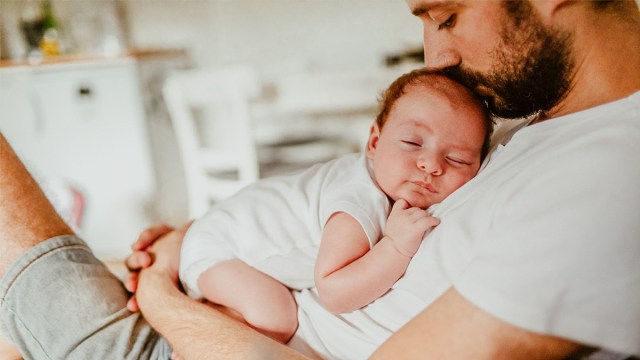If you’ve ever been jolted awake in the middle of the night by high-pitched giggles only to discover that your baby is fully asleep, you’ve probably wondered if they were dreaming—and what kinds of pint-sized escapades an infant could get into while they doze? Then there are the grunts, whimpers, and groans that break your heart thinking your teeny one is having a nightmare. But do babies dream? Can we even know if they do? We looked at the science and spoke with a sleep expert to find out.
Can babies dream?
Adults do most of their dreaming when they’re in the rapid eye movement (REM) sleep stage, which gets its name from the fact that our eyes move rapidly behind our lids while we dream. While it accounts for around 25% of a grownup’s total sleep, babies spend a whopping 50% of their time asleep in the REM stage.
“Dreaming itself is based on understanding daily life and processing the day’s events,” says Amanda Jewson, sleep expert and founder of Baby’s Best Sleep. “Although babies experience REM, it is unlikely that they dream the same way adults do, if at all.”
Researchers are divided on the subject. Some aren’t convinced that babies can dream like adults because their brains aren’t yet ready to create complex dream scenarios with characters, dialogue, and drama. Unlike adults, babies are still building new neural pathways during sleep, making it challenging for them to have vivid dreams until they’re older and have more life experiences (studies have shown that even preschoolers aged 3 and 4 don’t typically dream). Plus, even if babies did dream, they’re too young to tell us about it, so the whole thing is a bit of a mystery.
Whether they dream or not, Jewson says sleep scientists agree that the role REM really plays at this age is to help babies with cognitive and language development.
When do kids start dreaming?
The exact age at which littles start dreaming is far from exact and varies from kid to kid, however, research suggests that dreaming is a cognitive process that starts in early childhood. Studies like those conducted by researcher David Foulkes indicate that around the age of 4 or 5, kiddos may start recounting dreams with limited characters, plots, and memories. More vivid and complex dreams are commonly reported as they reach the age of 7 or 8. It’s important to note that individual experiences may vary, and not all kids can recall or describe their dreams by a particular age.
Do babies have bad dreams or nightmares?
Even though they sometimes cry in their sleep, researchers don’t think that babies have nightmares. As parents quickly learn, lots of those little grunts and not-so-little cries are more likely due to hunger, needing a diaper change, the feeling of their food digesting, or some other physical discomfort.
Related: 8 Things NOT to Do During a Sleep Regression
Jewson echoes that it’s highly unlikely for babies to experience nightmares. She says that while many of her clients will claim that their infants are waking in the night because of bad dreams, it’s much more common around the age of 2. Generally, nightmares are even more likely to occur in preschool-aged children and older.
“Nightmares are usually a fear-based response to the dream itself,” she says. “Young babies are not yet wired to understand that fear. And if they are dreaming, it’s unlikely that a baby’s waking results from a bad dream until after 2.”
Should you do anything if your baby is crying in their sleep or seems agitated?
Jewson says it’s important to understand that the idea of continuous sleep for babies (and adults) is a myth. “Anyone who says they want to sleep like a baby is unlikely to have a baby themselves,” she says. “All humans wake several times overnight. Adults will usually roll over and put themselves back to sleep, but babies may be hungry or require physical assistance to go back to sleep.”
If parents provide certain behaviors to help baby sleep—like feeding, pacifiers, rocking, patting, or cosleeping—Jewson says your baby may be looking for the same behavior to help them fall back to sleep again.
“This is usually the most common reason for frequent wakings. You should always have a plan to respond, even if you aren’t planning to remove those behaviors. This is especially true if wakings are new and unexpected.”
Other reasons your baby may cry in their sleep include overstimulation, sleep regressions, illness, or teething, which may require a little extra care and comfort. Sometimes these common sounds can even be a normal part of their sleep patterns, and in many cases they won’t fully wake up. If your baby’s crying persists, or if you’re concerned about their well-being, it’s always a good idea to chat with their pediatrician.
Whether your little one is dreaming about the family dog giving them a big lick on the face we just don’t know. What we do know is that all that sleep is helping them to grow and bringing them closer and closer to their first word. Maybe this time it’ll be “mama”!
Make sure to capture your sleeping baby’s little squeaks—and share them with your family and friends near and far—with the Tinybeans app. The secure platform puts parents in total control of who sees and interacts with photos and videos of their kids.











